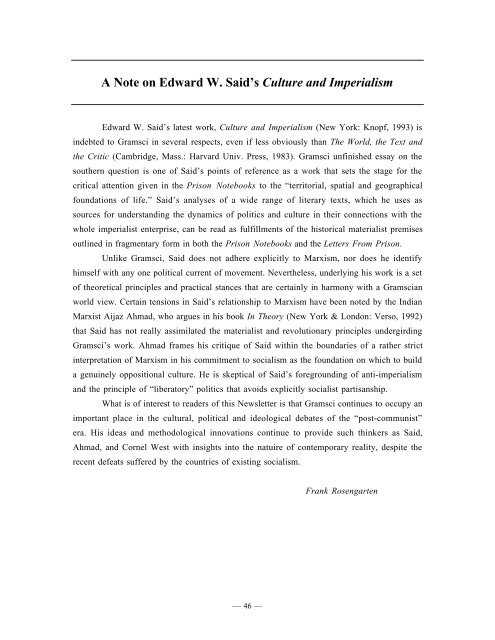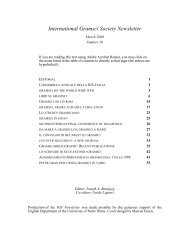Newsletter - International Gramsci Society
Newsletter - International Gramsci Society
Newsletter - International Gramsci Society
You also want an ePaper? Increase the reach of your titles
YUMPU automatically turns print PDFs into web optimized ePapers that Google loves.
A Note on Edward W. Said’s Culture and Imperialism<br />
Edward W. Said’s latest work, Culture and Imperialism (New York: Knopf, 1993) is<br />
indebted to <strong>Gramsci</strong> in several respects, even if less obviously than The World, the Text and<br />
the Critic (Cambridge, Mass.: Harvard Univ. Press, 1983). <strong>Gramsci</strong> unfinished essay on the<br />
southern question is one of Said’s points of reference as a work that sets the stage for the<br />
critical attention given in the Prison Notebooks to the “territorial, spatial and geographical<br />
foundations of life.” Said’s analyses of a wide range of literary texts, which he uses as<br />
sources for understanding the dynamics of politics and culture in their connections with the<br />
whole imperialist enterprise, can be read as fulfillments of the historical materialist premises<br />
outlined in fragmentary form in both the Prison Notebooks and the Letters From Prison.<br />
Unlike <strong>Gramsci</strong>, Said does not adhere explicitly to Marxism, nor does he identify<br />
himself with any one political current of movement. Nevertheless, underlying his work is a set<br />
of theoretical principles and practical stances that are certainly in harmony with a <strong>Gramsci</strong>an<br />
world view. Certain tensions in Said’s relationship to Marxism have been noted by the Indian<br />
Marxist Aijaz Ahmad, who argues in his book In Theory (New York & London: Verso, 1992)<br />
that Said has not really assimilated the materialist and revolutionary principles undergirding<br />
<strong>Gramsci</strong>’s work. Ahmad frames his critique of Said within the boundaries of a rather strict<br />
interpretation of Marxism in his commitment to socialism as the foundation on which to build<br />
a genuinely oppositional culture. He is skeptical of Said’s foregrounding of anti-imperialism<br />
and the principle of “liberatory” politics that avoids explicitly socialist partisanship.<br />
What is of interest to readers of this <strong>Newsletter</strong> is that <strong>Gramsci</strong> continues to occupy an<br />
important place in the cultural, political and ideological debates of the “post-communist”<br />
era. His ideas and methodological innovations continue to provide such thinkers as Said,<br />
Ahmad, and Cornel West with insights into the natuire of contemporary reality, despite the<br />
recent defeats suffered by the countries of existing socialism.<br />
— 46 —<br />
Frank Rosengarten



